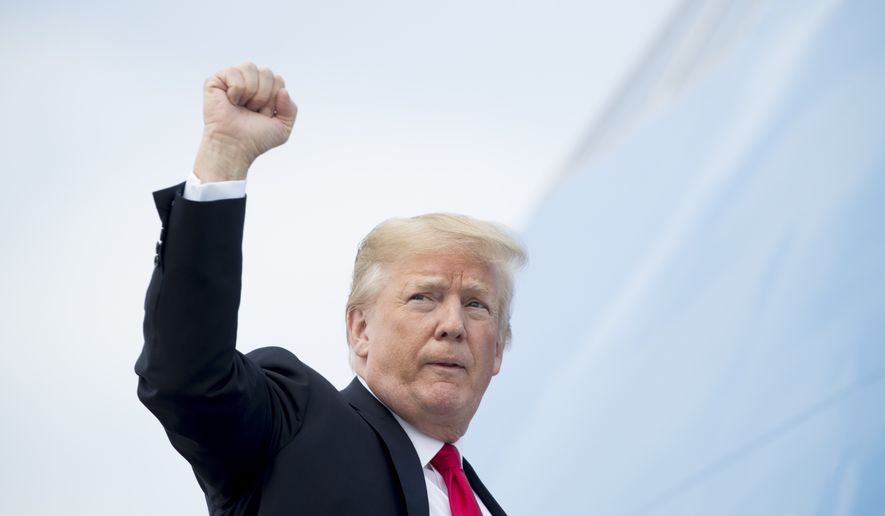President Trump’s team ramped up preparations Tuesday for a summit with North Korean dictator Kim Jong-un, providing the most promising signals yet that the on-again, off-again meeting is back on, and fueling new optimism that a denuclearization deal is in the works.
Mr. Trump heralded progress toward the Singapore summit and applauded North Korea’s “solid response” to his letter last week in which he canceled the June 12 summit.
Later Tuesday, the White House called it the “expected summit” and detailed the extensive effort to lay the groundwork for a deal for North Korea to give up nuclear weapons.
“Since the President’s May 24th letter to North Korean leader Kim Jong-un, the North Koreans have been engaging. The United States continues to actively prepare for President Trump’s expected summit with leader Kim in Singapore,” White House press secretary Sarah Huckabee Sanders said in a statement.
The implication was that Mr. Trump’s gambit of canceling the meeting had succeeded in getting the talks back on track.
A dizzying array of diplomacy played out on multiple fronts:
• Kim Yong-chol, a North Korean general and vice chairman of communist regime’s ruling central committee, flew to the U.S. for a meeting later this week with Secretary of State Mike Pompeo.
• A June 7 meeting was set at the White House between Mr. Trump and Japanese Prime Minister Shinzo Abe to synchronize strategy for the summit.
• A high-level U.S. delegation was holding a series of talks with top North Korean officials in the demilitarized zone (DMZ) between North and South Korea.
• White House Deputy Chief of Staff Joe Hagin and a U.S. advance team was in Singapore coordinating the logistics of the summit.
• National Security Adviser John R. Bolton talked by phone with his counterpart in South Korea, part of the what the White House described as his daily calls to South Korea and Japan to prep for Trump-Kim talks in Singapore.
David C. Kang, director of the Korean Studies Institute at the University of Southern California, said he was optimistic that not only would a summit take place but a deal to begin denuclearizing North Korea would be struck.
“There has already been a lot of behind-the-scenes negotiating,” he said. “The two sides know more about what they plan to do, and I think the real question will be what Trump decides to declare a success.”
North Korea is unlikely to accept a complete, unilateral surrender of its nuclear weapons, as Mr. Trump originally demanded. But a deal to phase out nuclear weapons was within reach, Mr. Kang said.
“Trump, to his credit, is willing to talk to the North Koreans. The only way you find out what is possible is by talking to them,” he said. “That’s what the negotiations are for. Compared to three or six months ago, we are in such a better place.”
South Korean President Moon Jae-in gave an upbeat assessment of the upcoming summit after a secret meeting Saturday with Mr. Kim in the DMZ.
“Chairman Kim made clear once again his intentions to completely denuclearize the Korean Peninsula,” Mr. Moon said in a speech Sunday. “He expressed his willingness to work together to promote peace and prosperity as well as to put an end to the history of war and confrontation through the success of the North Korea-United States summit.”
The arrival of Gen. Kim, a former North Korea spy chief who is considered Mr. Kim’s right hand, underscored the progress being made.
He is the most senior North Korean official to visit the U.S. in 18 years.
Mr. Trump tweeted that the visit showed North Korea’s “solid response” to his letter.
“We have put a great team together for our talks with North Korea. Meetings are currently taking place concerning Summit, and more,” Mr. Trump tweeted.
Gen. Kim also accompanied Mr. Kim in his surprise meeting Saturday with South Korean President Moon Jae-in to try to salvage the summit.
He took an Air China flight Tuesday from Beijing to New York. He also came with some political baggage.
The Treasury Department in August 2010 designated him as leader of the North’s intelligence agency for suspected involvement in conventional arms sales.
South Korea officials accused Gen. Kim of being the mastermind behind the 2010 sinking of the Cheonan, a South Korean naval ship that went down in the Yellow Sea in March 2010, killing 46 seamen.
U.S intelligence agencies linked him to a cyberattack on Sony Pictures in 2014.
North Korea denied involvement in both attacks.
Mintaro Oba, a former State Department official specializing in North Korea, described the general’s visit as both opportunity and risk for the Trump administration.
“We can also probably expect that some in Washington may raise concerns about the optics of meeting with an official with Kim Yong-chol’s past of provocations,” he told NK News, a South Korea-based news service.
• S.A. Miller can be reached at smiller@washingtontimes.com.




Please read our comment policy before commenting.